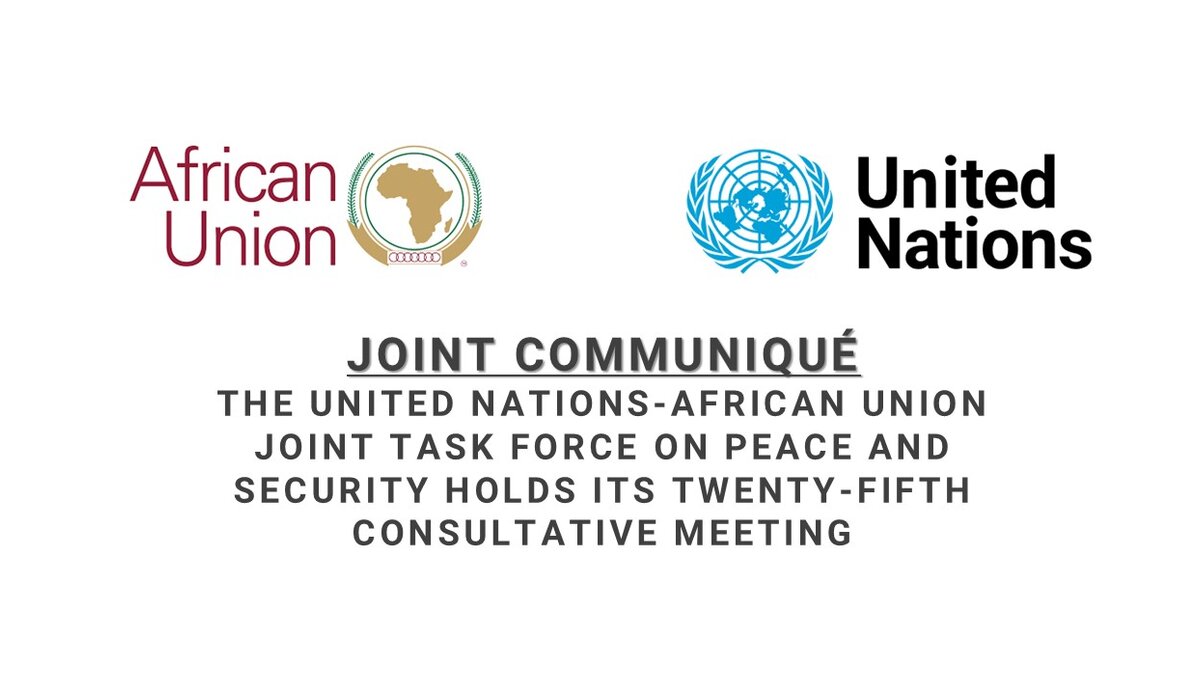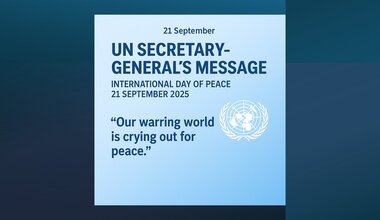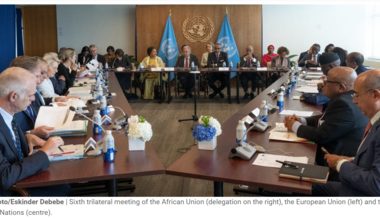Joint Communiqué on the United Nations-African Union Joint Task Force on Peace and Security holds its Twenty Fifth Consultative Meeting
The United Nations-African Union Joint Task Force on Peace and Security held its Twenty Fifth consultative meeting on 27 September 2025, in New York.
The meeting reviewed the status of the partnership between the United Nations (UN) and the African Union (AU) including the implementation of the Joint UN-AU Framework for Enhanced Partnership in Peace and Security. In this context, the meeting discussed peace and security developments in the Democratic Republic of the Congo (DRC), Somalia, South Sudan ,the Sudan and on the upcoming elections in West Africa. Discussions also focused on the implementation of United Nations Security Council Resolution 2719 adopted on 21 December 2023.
The AU Commission and the UN Secretariat were represented respectively by Commissioner Bankole Adeoye (Political Affairs, Peace and Security); and Ambassador Mohamed Fathi Edrees; African Union Permanent Observer to the United Nations, the Under-Secretaries-General Rosemary DiCarlo (Political and Peacebuilding Affairs), Jean-Pierre Lacroix (Peace Operations), Atul Khare (Operational Support), as well as Parfait Onanga-Anyanga (Special Representative of the Secretary-General to the African Union) and Martha Ama Akyaa Pobee (Assistant Secretary-General for Africa for Political Affairs, Peacebuilding and Peace Operations). The meeting was also attended by other senior officials from the two organizations.
The Joint Task Force took note of the considerable progress achieved in the UN-AU partnership including with Regional Economic Communities and Regional Mechanisms (REC/RMs) in Africa. These include sustained collaboration on support to AU peace support operations, early warning, prevention initiatives and coordinated support to national authorities for the conduct of timely, peaceful, and inclusive elections, as well as for the promotion and protection of human rights.
The meeting welcomed efforts to deepen collaboration on operational support matters, including through joint learning and the exchange of knowledge and expertise. The meeting acknowledged the positive impact these efforts have had on mandate implementation across various operational contexts. Both organizations emphasized the need to strengthen collaboration in mediation support and increase focus on their joint initiatives on the women, peace and security, and youth peace and security agendas, as well as promoting the protection children conflict situations.
On Somalia, the Joint Task Force recalled the High-Level Financing Event for the African Union Support and Stabilization Mission in Somalia (AUSSOM) held on 25 September 2025 on the margins of the United Nations General Assembly and co-hosted by the Federal Government of Somalia, the AU, the UN and the United Kingdom, and urged for adequate, predictable and sustainable funding for AUSSOM.5. The meeting highlighted that AUSSOM remains under-funded. The two organizations reaffirmed that sustained and predictable funding for AUSSOM is indispensable. They underscored the need for continued close UN-AU collaboration to support Somalia in advancing its peacebuilding priorities and security transition. They stressed the importance of maintaining the operational effectiveness of the United Nations Support Office for Somalia (UNSOS) and its ability to deliver its mandate, specifically its logistical support to AUSSOM and the Somali Security Forces, in line with Security Council resolution 2767 (2024).
The UN and the AU commended ongoing regional and international efforts to broker a negotiated solution to the conflict in eastern DRC and normalize relations between the DRC and Rwanda. They underscored that the parties must urgently comply with the various AU decisions and UN Security Council resolution 2773 (2025), which called for an immediate and unconditional cessation of hostilities, and abide by their commitments in the 27 June Peace Agreement and the 19 July Declaration of Principles, brokered by the United States and the State of Qatar, respectively. The two organizations noted with great concern the disastrous humanitarian and human rights situation in eastern DRC and the untold suffering of the populations bearing the brunt of the conflict. They urged the parties to respect their obligations under international human rights and humanitarian law. They further called for strict respect for the sovereignty, independence and territorial integrity of the DRC and reiterated their readiness to continue supporting peace efforts.
The UN and the AU remained deeply concerned with the situation in South Sudan. They reiterated their call for unity and an inclusive implementation of the 2018 Revitalized Peace Agreement, by restoring trust among all its signatories and by fully reconstituting the Transitional Unity Government. The meeting encouraged the parties to engage in a genuine all-inclusive South Sudanese national political dialogue leading to a national reconciliation process which will culminate in the successful conduct of democratic elections in December 2026.
On the Sudan, the Joint Task Force reiterated its call on the warring parties for an immediate cessation of hostilities and unconditional permanent ceasefire, and stressed that dialogue is the only way to achieve the peace that the people of the Sudan demand. The Joint Task Force reaffirmed the critical AU-UN partnership on the Sudan, which remains essential as we work collectively toward a swift and sustainable resolution to the conflict. The meeting expressed deep concern over the dire humanitarian situation in Sudan and urged for the protection of humanitarian workers and convoys in order to allow smooth facilitation of life-saving assistance to the population in need.
The meeting underscored that UN Security Council resolution 2719 (2023) remains an important framework for the predictable financing of AU–led peace support operations (PSOs) on a case-by-case basis. They welcomed the approval of the UN-AU joint planning and joint mission support planning modalities for the deployment of AU-led PSOs. The Joint Task Force also highlighted the need to sustain engagements on the resolution with all relevant stakeholders to reinforce shared understanding and commitment.
The Joint Task Force discussed the 2025 upcoming elections in West Africa (Côte d’Ivoire, Guinea and Guinea-Bissau). The AU and the UN welcomed preparations for the upcoming presidential election in Côte d’Ivoire. The AU and the UN agreed to work together, in collaboration with ECOWAS, to support a timely return to constitutional order in Guinea and ensure that transition processes, including elections, are conducted in a peaceful, inclusive, and transparent manner. The meeting took note of the evolving political landscape ahead of the legislative and presidential elections scheduled for 23 November in Guinea-Bissau. The Joint Task Force stressed the importance of engaging constructively with all political stakeholders and civil society to ensure a credible and inclusive electoral process, whose results can be broadly accepted and respected; and emphasized the importance of ensuring the full participation of women and youth in the electoral process.
The next statutory meeting of the Joint Task Force will be hosted by the AU Commission at a date to be mutually convened by both organizations.
Source: https://www.un.org/sg/en/content/sg/note-correspondents/2025-09-27/note-...
 UN
UN





